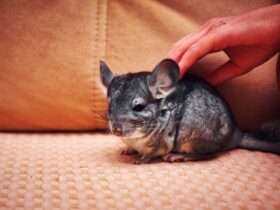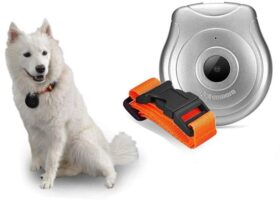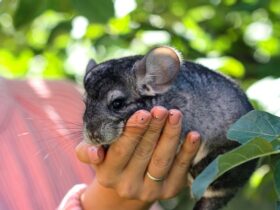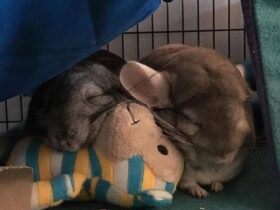Do you own a chinchilla and you what to make it happy?
You are in the right place!
Here you could learn what chinchillas love, and what dislike. You will learn how to play with them and which type of food they prefer. Very quickly you will have a happy chinchilla at home.


What Chinchillas Love
1.Best Food For Your Pet
Like any animal, food will surely cheer up chinchillas. Make sure to check the type of food that chinchillas are allowed to eat and in what quantities. Your chinchilla will look forward to food if it is healthy, and if you notice that it is not eating it means something is wrong. Check which foods are harmful to chinchillas and avoid them. There are many treats for chinchillas. You can choose between flowers, willow, dried apple, dried banana, and grape leaves. With this delicious food, you will have a happy chinchilla. Your chinchilla will enjoy healthy vegetables. You can give it carrots, kale, celery, alfalfa, potato, and squash. When buying food for your pet, make sure it contains enough vitamins, and that it is the best food for your chinchillas. Also, some chinchillas can be picky when choosing food, so make sure it likes that food before you buy larger quantities.
2.Play With Your Pet
Make sure your chinchilla is not bored and is not constantly locked in a cage. You can let it in your room where it would be safe and where it is not in any danger. You will be able to notice that it will start jumping for joy when you let it go or play with it. Of course, there are other ways you can entertain your chinchilla. Play music, give it toys, or anoint it. Chinchillas would not be interested in cuddling for long but will enjoy your attention. Most likely your chinchilla will not be interested in a full game with you, they prefer to find a hobby for themselves. You can help them a lot if you make that search easier for them. Make sure they are interested in the cage. Many indoor ferret cages or models designed for small animals will suit the chinchilla as well. You can stack the cage in several levels, with lots of obstacles and climbers. It will be an interesting way for them to play when they are bored. Chinchillas sometimes like to hide from everyone, so they will enjoy having their own little hiding place inside the cage. When playing with chinchillas outside the cage, offer them a treat to teach them to come to you.
3.Chewable Toys
Chinchillas love to nibble everything so buy them lots of toys that they can chew carefree. This will improve their tooth quality and reduce their boredom. Chinchillas will enjoy it and you will surely have a happy chinchilla. Be careful what material you buy so as not to swallow any harmful part. You can often buy chewable items that look like real food and can smell like it. This will be interesting to chinchillas and they will enjoy the game. Of course, you can give them a piece of wood to chew on, but make sure there are no pesticides in it. If you can taste parrot toys, they will be great for your chinchillas, because they are the most resistant to gnawing. In addition to these toys, you can also prepare toys for outside the cage. Your chinchilla will love running up and down the stairs. You watch out and remove all sharp and unwanted objects. Prepare cardboard boxes, cereal boxes, or paper boxes so your chinchilla has something to nibble on. This will destroy the paper and cardboard and leave your furniture intact.
4.Introduce Your Chinchilla With New Friend
Chinchillas will enjoy a solitary life in your home if you give them enough attention. But if you are rarely at home and do not stay with the chinchilla for a while you will notice that it becomes sad. So consider getting it a friend. Be careful when bringing in a new chinchilla because you do not know how one will react to the other. . The best way to get to know two chinchillas is to put them in separate cages, then place the cages next to each other but that the chinchillas cannot touch. Be careful not to get next to each other as they could start to bite. They will most easily get used to each other if they get used to each other’s smell first. Sure, instant lovemaking can happen, but it can happen that two chinchillas just can not get along. Have another cage nearby so you can separate them in time.


5.Big Cage
Your chinchilla must have a spacious cage. It must have enough space to move, jump, and sleep. Make sure you equip the cage with all the necessary contents. Set up food and water containers, toys, and hay. Check all parts of the cage so that there are no sharp edges and that the chinchilla will not get injured. Choose cage material carefully, as chinchillas like to chew everything. You can also fold small ladders on which they will climb. You can also put a wheel, but it has to be bigger. You can make the cages yourself, but you have to use strong material. If you own one chinchilla you will need a minimum of 4′ x 4′ x 3′ cage. Also, do not use galvanized wire, it is not healthy because it contains zinc. Although glass cages and containers look nice, they are not applied to chinchillas because they are not airy.
6.Night Fans
Chinchillas are nocturnal animals so it is no wonder they love the dark. When you decide to go on vacation, they will get a great desire to play and jump. Sometimes they can be very noisy during the night and even get out of the cage. So make sure you have a good cage and close the door well every night. Chinchillas will love to pound on the cage and you will often hear the squeaking and turning of the wheels. Be careful if you are going to silence them, approach them slowly without sudden movements so that they do not bite you. Chinchillas can have a very strong and painful bite. So if you’ve been wondering if your chinchilla needs light at night, it would not need it. He will enjoy the darkness and the game.
7.Stability And Stress
Animals feel stress and discomfort just as much as humans. So be careful how you treat your chinchilla and what you allow it to do. Make sure you give it all the conditions, take care of the animal and its health. Your chinchilla might be upset if you play loud music or tv. It can also be disturbed by other pets. Keep an eye on your dog and cat for a couple of weeks and keep them away from chinchillas. Observe what is bothering your pet and try to remove it. If you have small children, be by their side when they are near a chinchilla or when they are playing with it. Show them that they need to be gentle so as not to scare or hurt them. Other appliances can scare your chinchillas, too, but it will be a short time until they get used to it. If you remove stress from your chinchilla’s life it will continue to be happy and cheerful. Also, a chinchilla can experience stress if it does not like to be held. So make sure how the chinchillas like to be held, before you go touch them.
8.Veterinary Care
A healthy chinchilla is a happy chinchilla. Observe your chinchilla and take it to the vet regularly. When you notice that you are sad for a long time, or that you are not eating it is time to visit the vet. Before you get a chinchilla, check which diseases are common in them and what the symptoms are. So, if an illness occurs, you will be able to react quickly. Make sure your chinchilla is at a temperature of 20 °C. Never keep them in a room that is warmer than 26 °C. Also, do not place chinchillas in brightly lit areas or direct sunlight. it would be best to keep them at a normal temperature so that they do not get any disease. Pay attention to the room temperature because chinchillas like to be moderate, and they will be bothered by too hot and too cold. If you follow all these instructions your chinchilla will stay healthy and you will not have to visit the vet.
To Sum Up
Here you can read tips on how to make a happy chinchilla. Make sure the chinchilla has all the conditions. These include healthy food, good accommodation, water, a place to sleep, and lots of toys to chew on. If you decide to get another chinchilla, be careful when meeting them. Watch the food you give your pet because not all food is healthy for a chinchilla. Check the cage in which you put the chinchilla, how big it is, if it has everything a chinchilla needs and if it has sharp edges. If you have met all the conditions, and you notice that your chinchilla is sad and does not want to eat, visit a veterinarian.






















Leave a Reply